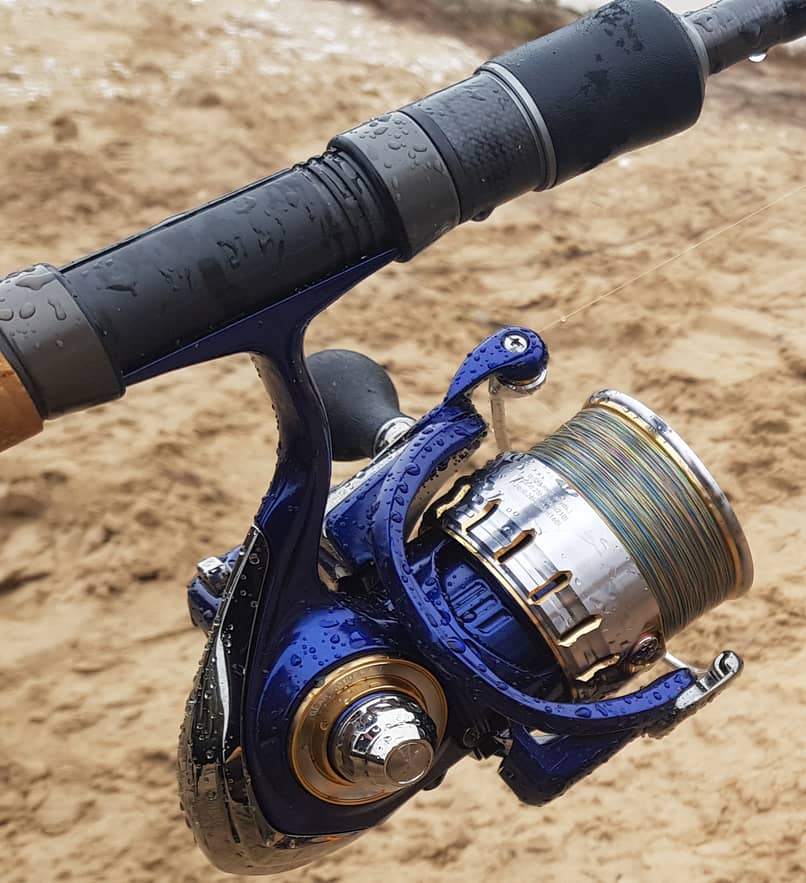
One thing I love about fishing is no matter how long you’ve been doing it, something unexpected can always happen! Sometimes, that unexpected event could be your reel being dropped off a dock by a young angler, a goliath grouper coming up and soaking the entire left side of your boat and equipment, or in south Florida, we have torrential downpours that come out of nowhere. Fishing keeps us on our toes, and it’s a blast, however, it’s important to know what to do to protect your gear in these instances.
Can Fishing Reels Get Wet
Fishing reels can get wet and are specifically designed with this in mind; however, it is best to wash and dry reels after every use to increase the lifespan of your reel. Some reel types are more susceptible to water damage than others, so it’s important to understand your reel’s limits and how to maintain them.
Quality fishing reels can be extremely durable against water damage, especially if you are performing proper maintenance on your reels. Most fishing reels nowadays are made of some type of corrosion-resistant material and are sealed to keep water from getting inside of the reel. Since many of the outside parts are made of corrosion-resistant material, the biggest concern is internal corrosion. Once the water makes its way into the internal gears of the reel, it is tough to dry these components unless you completely take apart your reel. In most cases, if your reel is just getting wet from mild splashes of fresh water and the occasional saltwater splash, your reel should be fine with minor maintenance. However, if you completely submerge your reel in saltwater for an extended period of time, there is a good chance your reel will not be the same.
Saltwater Fishing Reels
The only negative thing about saltwater fishing is the damage that it can do to your equipment. Reels that are specifically designed for fishing saltwater are almost always more water-resistant than freshwater reels. They are made of premium corrosion-resistant materials, including stainless steel, brass, and aluminum. Also, saltwater reels inner components, including gears, are sealed to limit water intrusion. Typically expensive reels have premium seals that resist water intrusion better than cheaper made reels. Though this is common, it is not always the case, so always do your research when buying a reel to make sure the reel you have in mind has good reviews, specifically mentioning the reel’s longevity and resistance to corrosion. When saltwater fishing, it is even more important to get the salt off your reel as soon as possible after fishing and really be diligent about not letting it get into the inner components.
Freshwater Fishing Reels
Freshwater fishing reels are not as water-resistant as their saltwater counterparts. Though some freshwater reels are entirely sealed, they are rarely made with the same premium materials that saltwater reels are constructed with. Because of this, freshwater reels tend to be cheaper, which can be great if you are strictly fishing freshwater but is not recommended if you are planning to use the reel for any saltwater fishing adventures.
Though fishing reels can get wet, they must be washed and dried as soon as possible, preferably at the moment of submersion or at the latest, when you get back to the house from fishing. The shorter amount of time a reel is kept wet, the better. If the reel gets wet with saltwater, I recommend cleaning off the reel right away to limit any possibility of premature corrosion.
On the other hand, if your reel is getting wet from freshwater, whether from a stream, river, lake, or pond, I would not be as concerned about getting everything cleaned off and dried off in the same time frame.
Is rain bad for my fishing reel?
The occasional rain on a reel is not bad, but I would not recommend leaving your reel out in the elements to get repeatedly rained on. If you are out fishing during a rainy day, just wash and dry off your fishing reels when you get back to the house. To increase your reel’s overall life span, I recommend re-oiling your reels after each rain and at least every third time out on the water. Keeping your reels oiled will assist your reel’s overall water resistance and stop corrosion in its tracks.
Are Fishing Reels Waterproof?
Fishing reels are not waterproof but instead considered to be water and corrosion-resistant. Water-resistance means that reels are not designed for complete submersion into bodies of water but rather are designed to resist mild splashes and sprays to the reel’s body.
Depending on the type of reel and the quality of the material, some reels can be more water-resistant than others. Saltwater reels, in general, are more water-resistant than freshwater reels. Some reels are known for their ability to resist water. One that comes to mind for many anglers is the Penn Torque. The Torque is an extremely heavy-duty reel built with many features that increase its overall water resistance, including a full metal body, side plate and rotor, IPX6 sealed body and spool, and complete stainless steel bearings.
The IP rating is international standardized testing that states the level of water resistance of an item. The IPX6 rating means that the reel can withstand heavy water pressure from multiple angles without having any adverse effects.
The “Reel” Concern
Fishing reels are going to get wet, and they are going to be fine! The real concern is limiting excess exposure, keeping it out of the inner parts of the reel, and avoiding dirt, sand, and other debris. Though many interior components of reels may be resistant to water, they can easily be damaged and scratched when small debris like sand or dirt enters them. These small debris can be lodged into the interworking of your reel and create significant damage even after just one use. Once sand enters into a reel, it is essential to stop the use of the reel immediately before any further damage is inflicted. At this point, it is best to take your reel apart to remove all notable debris before they have the chance to scratch anything.
Taking Care of A Reel After Submersion
If your fishing reel does get submerged in the water, here is a quick step-by-step guide to keep your reel running smoothly.
- Immediately after submersion, wash down your fishing reel with fresh water. It is important that the water stream is gentle rather than a strong blast of water. If water blasts the reel, there is a good chance the force of the water can push debris into the inner components of the reel.
- After the reel is washed off with fresh water, take a clean towel and remove any excess water from the reel.
- Once the reel is dry, remove the spool portion of the reel by unwinding your drag. It is crucial that the spool be removed before the next step because you do not want any reel oil to get on your fishing line.
- Once the spool is removed, lightly apply reel oil on the oil gear systems of the reel, including the driveshaft.
- After the oil has been applied, begin rotating the reel handle to work the oil throughout the reel. Once the oil is worked throughout the reel’s gears, you can place the spool back on the reel.
